

Biodiversity loss could be making us sick – here's why. By 2050, 70% of the world’s population is expected to live in towns and cities.
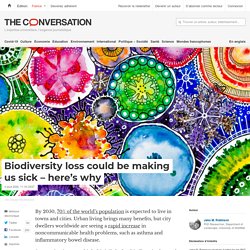
Urban living brings many benefits, but city dwellers worldwide are seeing a rapid increase in noncommunicable health problems, such as asthma and inflammatory bowel disease. Some scientists now think this is linked to biodiversity loss – the ongoing depletion of the varied forms of life on Earth. The rate at which different species go extinct is currently a thousand times higher than the historical background rate. Microbial diversity is a large part of the biodiversity that is being lost. And these microbes – bacteria, viruses and fungi, among others – are essential for maintaining healthy ecosystems. The inner ecosystem. Special Issue : Evidence-Based Nature for Human Health. Special Issue Editors Prof.
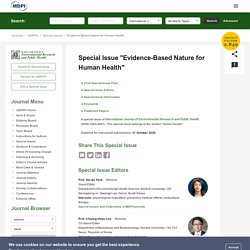
Sin-Ae ParkWebsiteGuest Editor Department of Environmental Health Science, Konkuk University, 120 Neungdong-ro, Gwangjin-gu, Seoul, South KoreaInterests: physiological evaluation; preventive medical effects; horticultural therapySpecial Issues and Collections in MDPI journals Prof. Healthy cities are more-than-human. In western thinking people generally consider themselves separate from, above, or in control of what we think of as nature.
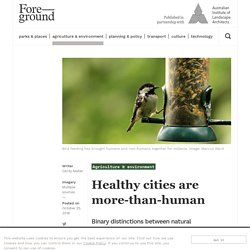
Even though the world is ever more urbanised, there is a large body of evidence that people remain highly dependent on the natural world: a view that is endorsed by organisations including the World Health Organization. Australian Association for Bush Adventure Therapy Inc. – Connecting Bush Adventure Therapy Practitioners Across Australia. Outdoor Healthcare, Naturally. The mandala of health: a model of the human ecosystem. Reproduced from: sci-hub.tw/10.1097/00003727-198511000-00002 Trevor Hancock, MB,BS, MHScAssociate Medical Officer of HealthDepartment of Public HealthCity of TorontoToronto, OntarioCanada FCH, 1985, 8(3), 1-10 © 1985 Aspen Systems Corporation IN RECENT years a major transformation in the understanding of health and disease has taken place.
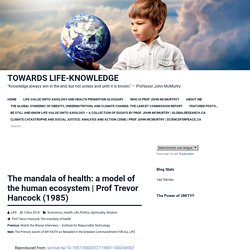
The emphasis has shifted from a simplistic, reductionist cause-and-effect view of the medical model to a complex, holistic, interactive, hierarchic systems view known as an ecologic model. That shift may be so profound as to constitute a paradigm shift or a change in the collective mind set and world view regarding what the rules are and what is possible.1. Cambridge Scholars Publishing. International Handbook of Forest Therapy. References. Policy Toolkit — ECOHealth. Forest Ecotherapy Who We Are - FOREST ECOTHERAPY. Living in view of a park or garden reduces cravings for chocolate, cigarettes and alcohol. Being in Nature Makes Your Heart Healthier. Here's a novel way to keep health-care costs down: Plant more trees.
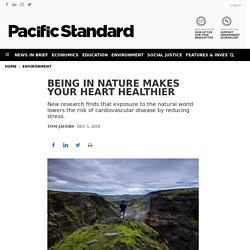
That might seem like a non sequitur, but considerable research has linked green space with better human health. A new study provides new evidence for this beneficial connection, along with at least a partial explanation for its power. The study finds that people who live in leafier areas have lower levels of several stress-related biomarkers, including adrenaline. In addition, they have an enhanced ability to grow and repair blood vessels. "Increasing the amount of vegetation in a neighborhood may be an unrecognized environmental influence on cardiovascular health," said lead author Aruni Bhatnagar, professor of medicine at the University of Louisville.
The study, in the Journal of the American Heart Association, featured 408 people recruited at a preventive cardiology clinic in Louisville, Kentucky. Nature-Deficit Disorder. Scientific Research and Pandemic Prevention - EcoHealth Alliance. Ecohealth Gallery of Actions on Climate Change. Exploring Energy Outreach Program Leave a Reply.
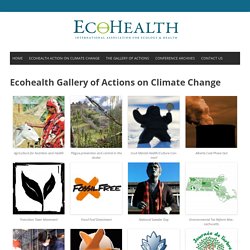
STATEMENT OF THE 7TH BIENNIAL CONFERENCE OF THE INTERNATIONAL ASSOCIATION OF ECOLOGY AND HEALTH Oct5VF. How does nature boost your health and happiness? Many of us make the time for things like exercise and healthy eating because we’re aware of the health benefits.
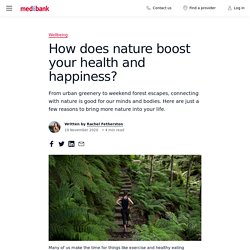
But with more and more Australians living in urban settings, plenty of research now shows we are neglecting another very healthy activity – engaging with nature. Nature engagement might be as simple as visiting your local park, doing some gardening or walking your dog. But such simple activities can have profound results. Two-hour ‘dose’ of nature significantly boosts health – study. A two-hour “dose” of nature a week significantly boosts health and wellbeing, research suggests, even if you simply sit and enjoy the peace.
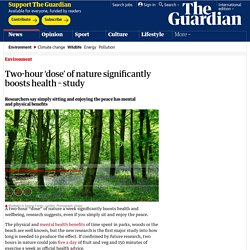
The physical and mental health benefits of time spent in parks, woods or the beach are well known, but the new research is the first major study into how long is needed to produce the effect. If confirmed by future research, two hours in nature could join five a day of fruit and veg and 150 minutes of exercise a week as official health advice. The finding is based on interviews with 20,000 people in England about their activity in the previous week.
Of those who spent little or no time in nature, a quarter reported poor health and almost half said they were not satisfied with their life, a standard measure of wellbeing. In contrast, just one-seventh of those who spent at least two hours in nature said their health was poor, while a third were not satisfied with their life. “I am continually surprised by the size of the effect,” White said. Natural health service: wildlife volunteers get mental health boost. Volunteers on wildlife projects benefit from a big boost to their mental health, according to new research.
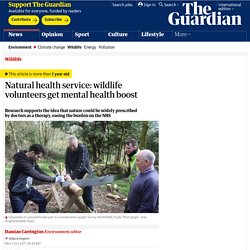
It advances the idea that nature could be widely prescribed by doctors as a therapy, which its supporters say would ease the burden on the NHS. The new analysis tracked people across England taking part in projects run by the Wildlife Trusts, ranging from nature walks and conservation work to the Men in Sheds project in Bolton, which makes bird tables and bug hotels.
The volunteers’ wellbeing was tracked using questionnaires by researchers from the University of Essex and they found that half of the people who started with low mental wellbeing had improved after 12 weeks. Earth - How nature is good for our health and happiness. There are a growing number of studies and campaigns putting forward evidence that a connection with nature makes us healthier and happier people, something that few of us nature lovers would argue with.
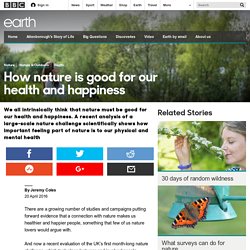
And now a recent evaluation of the UK’s first month-long nature challenge, which took place last year and involved people "doing something wild" every day for 30 consecutive days, shows scientifically and statistically how significant it really is. Intuitively we knew that nature was good for us as humans, but the results were beyond brilliant. Take Me To The Woods: The Rise In People Needing Nature.
Ecological grief as a mental health response to climate change-related loss. Environmental Surveillance Methods Workshop funded by BMGF at Cali compressed. The Human–Nature Relationship and Its Impact on Health: A Critical Review. Vitamin N - Overview - Richard Louv. The Essential Guide to a Nature-Rich Life: 500 Ways to Enrich Your Family’s Health & Happiness “Vitamin N (‘N’ is for nature) is everything the worried parent needs . . . The accessibility of Louv’s writing is what truly shines, and his enthusiasm, so evident in earlier works, is on overdrive here.
Anyone who works with children will embrace this title; families will be thrilled by its offerings. This is, without question, another shot out of the park for nature-advocate Louv.” —Colleen Mondor for Booklist, starred From the author of the New York Times bestseller that launched the international children-and-nature movement, Vitamin N (for “nature”) is a complete prescription for connecting with the power and joy of the natural world right now, with:
Annualreviews. Home - Richard Louv. Does nature have restorative powers when it comes to health? How's the serenity? " our mate Darryl Kerrigan from The Castle would say, if he were sitting here. "So much serenity, Daz," I would reply, taking in the sprawling valley where I am sitting. I'm surrounded by 300-metre-high sheer sandstone escarpments, which throw waterfalls during heavy rain, and eucalypt forest dotted with ancient black cypress pines. The silence is punctuated with the gentle song of some of the 152 different bird species in this 2830-hectare wildlife conservation area in the Greater Blue Mountains region in NSW. Eastern grey kangaroos recline, sunning their bellies, while the wombats, whose top speed of 40 kilometres an hour makes them almost as fast as Usain Bolt, graze lazily.
It's often not until we pause that we realise how ragged our lives have become. Our body clock is powered by natural light, which resets our circadian rhythm each day, stimulating hormones that energise us during the day and help us settle into the night. The environmental efficiency of well being A crossnational analysis. Environments that Promote Mental Health and Wellbeing. Knowledge to Action Project: Improving Social and Environmental Determinants of Health through Integrated Health Governance. The theme of ‘Ecohealth & Watersheds’ has gained increased attention from researchers, watershed groups, and policy makers who share interest in the re-integration of public health priorities with water resources management.
Converging health impacts from socio-economic, environmental and demographic change in northern, rural, and remote communities of BC demand collaboration in order to optimise limited resources. Within watersheds, issues of concern range from the sources, supply and safety of drinking water, to the role of water resources as a foundation for sustaining livelihoods, food security, economies and cultural values.
Project Phases: Phase I: Tools for Integration. University of Northern British Columbia. May 8, 2017 Prince George, BCECHO Network Launch Margot Parkes and a team of researchers and partners from across Canada have secured a five-year research grant focused on working together across sectors to prevent adverse impacts from resource development, with specific emphasis on rural, remote and Indigenous communities. The study will receive $2 million from the Canadian Institutes of Health Research (CIHR).
For more information view the press release here. December 3-7, 2016 Melbourne, AustraliaOne Health Ecohealth 2016 Conference Margot Parkes recently attended the One Health Ecohealth 2016 conference in Melbourne, Australia. To view highlights from the conference check out the #oheh and #ohehstudents2016 twitter accounts. October 17, 2016 Kaitaia, New ZealandTiakina te Taiao, Tiakina te lwi, Te Hiku o Te Ika Environmental Research Symposium Margot Parkes co-faciliatated a session titled "Te Hiku environmental vision/strategy: getting in the zone körero (all).
The Relationship between Neighbourhood Green Space and Child Mental Wellbeing Depends upon Whom You Ask: Multilevel Evidence from 3083 Children Aged 12–13 Years. A relationship between environmental degradation and mental health in rural Western Australia. Abstract Australia is currently experiencing a process of escalating ecosystem degradation. This landscape degradation is associated with many outcomes that may directly or indirectly impact on human health.
This study used a Bayesian spatial method to examine the effects of environmental degradation (measured as dryland salinity) on the mental health of the resident rural population. WLD 8 Integrating ecological. WLD 10 Nature is good medicine. 4.4 Health » CRCSI. The CRCSI Health Program brings together expertise in spatial and health sciences to form collaborative partnerships with research institutions, government agencies, health service providers and clinicians, the private sector and the community. We exist to improve efficiency of health resource management and increase knowledge of disease cause through spatial technology. We can assist your organisation through a number of services and opportunities. Consultation services (commissioned projects)Joint research projectsConnections with our expert spatial networkIncrease awareness of spatial technology capabilities. To explore how we can work together to apply spatial technologies please contact Paula Fievez.
Spatial Health answers the key question 'Does my location affect my health', we help to map disease, find causes (find what it is related to) and improve service delivery. Spatial Information has long been used in the Health sector to pinpoint areas of risk for specific diseases. El Niño is causing global food crisis, UN warns. Farmer was deeply depressed when he killed environmental officer, court hears. NSW farmer Ian Turnbull had spiralled into a deep depression and lost the capacity to judge right from wrong when he killed environmental officer Glen Turner, a jury has been told. Turnbull’s lawyer, Todd Alexis SC, said the lifelong farmer had stoically weathered the “feast and famine” of life on the land and always managed to scrape through to provide for his family. A Primrose Path? Moderating Effects of Age and Gender in the Association between Green Space and Mental Health.
How climate change is affecting mental health status. The first time I felt the intensity of an Australian climate change event was when I witnessed the black Saturday bushfires (on 7 February 2009) through my TV screen in New Zealand. Shocked with the images that I was watching I could not take my eyes out of the screen as the news unfolded. With the devastation, destructions and unfortunately 173 deaths, that event was one of the most “Dantestic” scenes I have ever witnessed. A Lunchtime Walk in Nature Enhances Restoration of Autonomic Control during Night-Time Sleep: Results from a Preliminary Study. How much air do we breathe? How much should we breathe? How much air do people breathe? Ecohealth Knowledge to Action Research Group. Aspiring towards healthier ecosystems, people and animals: Conversations on the 2016 OneHealth/Ecohealth Congress from the perspective of emerging scholars and practitioners - VIUTube - Video Portal from Vancouver Island University.
Planetaryhealthalliance. Environmental Health. Our Supporters. 'NaturePlay' film reveals Scandinavia's amazing nature-based education system. This new award-winning documentary reveals the stark contrasts between America's obsession with standardized tests, at the cost of everything else, and Scandinavia's embrace of all things nature-based. It's clear which is the more successful approach. APA Conference 2016 - Keynote Speakers. Professor Alan Lopez. One Planet Living - a sustainability framework by Bioregional.